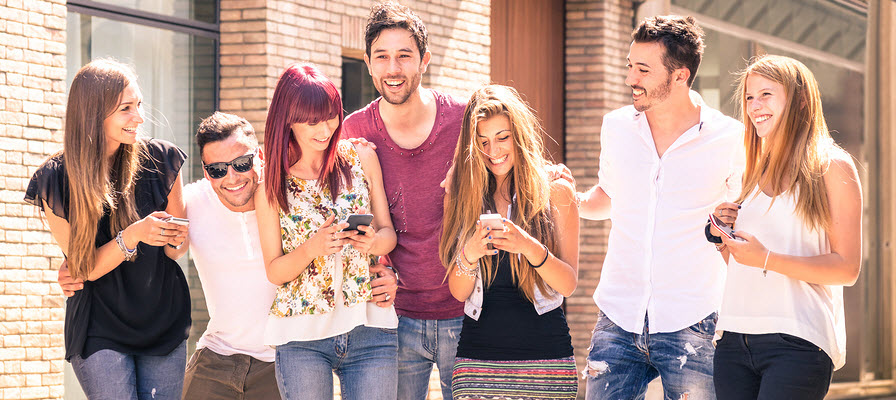Table of Contents
Key Takeaways
- 1. Social anxiety involves intense fear and avoidance of social situations, impacting mental clarity and overall quality of life.
2. Imbalances in neurotransmitters like serotonin, dopamine, GABA, and norepinephrine significantly contribute to social anxiety.
3. Natural nootropics such as L-Theanine (which promotes relaxation), Ashwagandha, Bacopa Monnieri, Rhodiola Rosea, and Magnesium effectively lower stress and ease anxiety symptoms without typical pharmaceutical side effects.
4. Natural beta-blocker alternatives like Magnesium and Potassium can manage physical symptoms of anxiety, such as rapid heartbeat and trembling.
5. Combining targeted nootropics can enhance confidence, calm nerves, and improve social performance, creating long-term relief from social anxiety.
What is Social Anxiety?
If you feel inadequate, embarrassed, inferior or humiliated. And it prevents you from going out, meeting new people, or generally messes with your mental energy and quality of life – nootropics can help.
 Social anxiety is a form of anxiety. And according to one study affects at least 14% of people living in the U.S.[i] I have a feeling that that estimate is far too low and not an accurate estimate of what’s really going on in our community.
Social anxiety is a form of anxiety. And according to one study affects at least 14% of people living in the U.S.[i] I have a feeling that that estimate is far too low and not an accurate estimate of what’s really going on in our community.
You are dealing with social anxiety if you tend to avoid going into any situation where you feel you may be negatively judged or evaluated. Back in the day, they used to call these things ‘phobias’. In this case, it was “social phobia”.
People with social anxiety often remain in a state of high alert, even after the social situation has ended, making it difficult to relax and regain peace of mind.
In this post, you’ll find out why prescription drugs often do not succeed in taming your symptoms. Here you’ll learn about some natural options that may work better for your social anxiety symptoms.
Use the “Table of Contents” above if you’d like to skip down to nootropic supplement suggestions so you can get started right away.
What Causes Social Anxiety?
Social anxiety can be caused by a number of cognitive issues that can wreak havoc with your emotional regulation and anxiety levels:
Genetics: If you have a family history of anxiety, depression, or related mood disorders you are more likely to experience social anxiety. Genetic susceptibility can influence the structure and sensitivity of brain cells and networks involved in fear and emotional processing.
Brain chemistry: Neurotransmitter imbalances often play a key role in the development of social anxiety. Low levels of serotonin and GABA can lead to reduced mood stability and poor stress regulation. Dopamine dysregulation may reduce motivation and heighten feelings of self-consciousness. Elevated norepinephrine can create a hyper-alert, fight-or-flight state that amplifies social tension.[ii]
Personality traits: Traits such as behavioral inhibition, heightened sensitivity to rejection, and high neuroticism contribute to an overactive response to perceived social threats. If you have low self-confidence or high levels of self-criticism you are particularly prone to anxiety in social settings.
Environment and experiences: Traumatic social experiences—such as bullying at school, exclusion, or embarrassment—can create associations between social interaction and emotional pain. Overprotective or overly critical parenting can also foster social avoidance or dependence.
Cognitive patterns: People with social anxiety often engage in negative self-talk, catastrophizing, and overgeneralization. You may mentally rehearse potential failure or judgment before social events, reinforcing or anticipating anxiety and avoidance behaviors.
These risk factors contribute to overactivation of the amygdala (your brain’s emotional threat detector) and under activation of your prefrontal cortex (which helps regulate and rationalize fear responses).
This neural imbalance creates a feedback loop where social threats feel exaggerated and difficult to control, perpetuating social anxiety symptoms.
In these situations, the body’s stress response is triggered, activating the fight-or-flight mechanism and leading to physical symptoms like increased heart rate, sweating, and emotional distress.
What Does Social Anxiety Feel Like?
 In social settings, individuals with SAD experience:
In social settings, individuals with SAD experience:
Physical symptoms: Rapid heartbeat, trembling, sweating, blushing, nausea, shortness of breath, and muscle tension.
Cognitive symptoms: Persistent worry about being negatively evaluated or appearing foolish.
Emotional symptoms: Overwhelming feelings of dread, fear, shame, or humiliation.
Behavioral symptoms: Avoiding eye contact, speaking at inappropriate times or not speaking at all, or avoiding social gatherings.
In severe cases, these symptoms can become debilitating and significantly interfere with daily functioning.
These symptoms often lead to feelings of isolation or underperforming in public roles because of fear of scrutiny.
How does social anxiety work in the brain? Neuroscience breakdown
Social anxiety is rooted in neural circuitry involving:
- Amygdala hyperactivity: Over-sensitive to negative social cues, like criticism or rejection.[iii]
- Prefrontal cortex under-regulation: The medial prefrontal cortex normally dampens amygdala responses; weak top-down control means heightened anxiety in social settings.[iv]
- Neurotransmitter imbalances:
- GABA: Main inhibitory neurotransmitter; low GABA activity causes over-arousal.[v]Serotonin: Important in mood and anxiety regulation; imbalance contributes to heightened social fear.[vi]Dopamine: Drives reward and motivation; low levels can reduce confidence and exacerbate negative self-focus.[vii]Norepinephrine: Heightened stress/fight-or-flight response in social contexts.[viii]These neurotransmitters and brain regions are all components of the central nervous system, which coordinates the body’s response to social stress.
- Stress hormones: Elevated cortisol worsens neural sensitivity to social interactions specifically.[ix]
SAD reflects overreactive threat detection and insufficient neural regulation, leading to anxiety symptoms when faced with social interactions.
 Nootropics for Social Interactions
Nootropics for Social Interactions
Navigating social interactions can be challenging for those who experience social anxiety, but the right nootropics can make a significant difference.
Nootropics for social anxiety are designed to support both mental and bodily health by targeting the underlying anxiety symptoms that make social situations feel overwhelming.
These supplements work by enhancing cognitive function, reducing stress levels, and promoting a sense of calm, which can help you feel more at ease during social interactions.
Some of the best nootropics for social interactions include L-Theanine, Rhodiola Rosea, and Bacopa Monnieri.
L-Theanine, found naturally in green tea, is well-known for its ability to promote relaxation without causing drowsiness, making it easier to engage in conversations and group activities.
Rhodiola Rosea helps the body adapt to stress, supporting a balanced mood and improved cognitive function even in high-pressure social settings.
Bacopa Monnieri, another powerful adaptogen, has been shown to reduce anxiety symptoms and support memory and mental clarity, which can be especially helpful when you need to think on your feet.
By incorporating these nootropics for social anxiety into your routine, you may notice various subtle improvements in your ability to handle social situations. Whether you’re attending a meeting, giving a presentation, or simply socializing with friends, these supplements can help reduce anxiety, boost cognitive performance, and make social interactions feel less daunting.
 What are the best nootropics to reduce social anxiety symptoms?
What are the best nootropics to reduce social anxiety symptoms?
Many natural nootropic supplements have evidence supporting their anti-anxiety effects.
In addition, many of these nootropics are also valued for their cognitive enhancement properties, improving memory, focus, and decision-making.
L‑Theanine
L-Theanine is an amino acid found in green tea. It helps reduce cortisol, increases brain levels of GABA, serotonin, dopamine, and boosts alpha brain waves and theta brain waves .
Clinical trials (100–150 mg 3-times per day) using an L-Theanine supplement shows stress relief, lowered heart rate, and reduced anxiety in social situations.[x]
Ashwagandha
An Ayurvedic adaptogen. Ashwagandha lowers cortisol and increases the sensitivity of GABA receptors which helps reduce stress levels and less social anxiety.
Clinical studies have shown Ashwagandha can repair and even reverse damage caused in the brain caused by chronic anxiety and stress. Recommended Ashwagandha extract dosage for general anxiety is 300 mg twice per day.
Bacopa Monnieri
Bacopa Monnieri is an herbal adaptogen that has been used since ancient times to reduce anxiety, depression and stress. It protects your neurons and balances neurotransmitters.
Bacopa Monnieri has a significant anxiolytic (anti-anxiety) effect. It appears to modulate brain levels of the neurotransmitter serotonin. This has an effect on mood regulation.
Research at Banaras Hindu University in India showed Bacopa Monnieri as effective for reducing symptoms of anxiety as the benzodiazepine drug lorazepam.[xi]
Recommended dosage of Bacopa Monnieri containing 20% bacosides is 750 mg per day.
Rhodiola Rosea
Rhodiola Rosea activates AMPA receptors in your brain. Which helps decrease depression and stress-related mood swings, reduces fatigue, stimulates energy and alertness and boosts cognition.
Rhodiola Rosea boosts mood by influencing serotonin and norepinephrine levels in your brain, and the feel-good opioids like beta-endorphins.[xii]
Recommended dose of Rhodiola Rosea extract is 150 – 200 mg per day.
Phosphatidylserine (PS)
Phosphatidylserine (PS) helps lower cortisol which is effective in relieving stress.
Many clinical trials with Phosphatidylserine (PS) have shown improvements in working- and long-term memory, recall, logic and even speech. Attention span increases while using Phosphatidylserine (PS). And motivation, socialization and initiative all increased when using Phosphatidylserine (PS) as a nootropic.[xiii]
Recommended Phosphatidylserine (PS) dosage is 300 mg per day.
GABA precursors and analogues
GABA
Clinical studies show that boosting GABA with a supplement relieves anxiety, stress, and boosts the production of alpha brain waves.[xiv] Recommended dosage of PharmaGABA is 250 mg per day.
Taurine
Taurine modulates GABA and glycine receptors in the brain which helps treat anxiety.[xv] Recommended Taurine dosage is 500 – 2000 mg per day.
Aniracetam, Noopept (Racetam family)
Aniracetam
Aniracetam can reduce anxiety, depression and fear. And increase sociability. It works by its effects on dopamine and serotonin receptors in your brain. Improving verbal fluency.[xvi] Recommended dosage for Aniracetam is 750 mg twice per day.
Noopept
Noopept boosts Alpha and Beta brain wave activity.[xvii] You become calmer and more creative. It’s easier to go into a flow state. And you are prone to making innovative and resourceful decisions. Recommended Noopept dosage is 10 – 30 mg per day.
L‑Tyrosine
L- Tyrosine is a precursor to dopamine and norepinephrine, boosting mental clarity, mood and confidence during stressful situations.[xviii] Recommended L-Tyrosine dosage is 500 mg twice per day.
Magnesium (especially L-Threonate)
Magnesium is a precursor to the synthesis of GABA, dopamine and serotonin which stabilizes mood, and supports cognitive function.[xix]
Magnesium L‑Threonate is particularly neuroactive and consistent daily use can help reduce prolonged anxiety. Recommended dosage of Magnesium L-Threonate is up to 1,000 mg per day
Kava
Kava seems to provide a calming effect by increasing the number of GABA-a receptors. And Kava inhibits norepinephrine reuptake. Clinical trials show short‑term anxiety relief comparable to prescription anxiolytics.[xx]
Kava extracts have also been seen to bind to GABA, dopamine, serotonin and opiate receptors as well. This implies that more of each neurotransmitter is available to your brain since their associated receptors are blocked or inhibited by Kava.
Most research shows there is little to no evidence to support the notion of liver damage when using Kava. For example, one large review out of the University of Melbourne included 24 clinical studies.
One of the researchers stated, “Of the 435 clinical trial participants taking Kava supplements in our review, some at high doses, no liver issues were reported. Therefore, the current review supports the conclusion that liver toxicity is indeed a rare side effect.”[xxi]
Look for a Kava extract called “WS1490”. For anxiety and other cognitive issues use 300 mg of this extract daily. Preferably split into three 100 mg doses. One dose in the morning, one in the early afternoon and the last in the evening.
 Nootropic Supplements Alternatives to Beta Blockers
Nootropic Supplements Alternatives to Beta Blockers
Beta blockers (e.g., propranolol) reduce physical anxiety by blocking adrenergic receptors—but many natural options offer milder effects:
Magnesium
Magnesium acts like a beta blocker, reducing stress-induced heart rate and blood pressure. See Magnesium above for all the ways this mineral will boost cognitive performance.
Potassium
Potassium channels in your brain are involved in serotonin regulation. And how serotonin is used to reduce feelings of guilt, helplessness, hopelessness, low self-worth and even suicide.[xxii]
You need adequate levels of potassium for serotonin to work and do its job. Even small decreases in optimal potassium levels can result in social and generalized anxiety.
What are the best natural alternatives to SSRIs, MAOIs & other anti‑anxiety drugs?
For you if you are looking for alternatives to prescription treatments like SSRIs or benzodiazepines:
Ginkgo biloba is another natural supplement that may help regulate serotonin levels and reduce anxiety and is often included in herbal nootropic stack for its safety and effectiveness.
St. John’s wort
St. John’s wort inhibits the uptake of serotonin, dopamine, GABA, glutamate and norepinephrine. Inhibiting the neuronal uptake of these neurotransmitters can have a profound effect on depression and mood.[xxiii]
And St. John’s wort moderates the genes controlling the function of your HPA-axis which is directly related to symptoms of anxiety disorder, social anxiety, and stress responses.
St. John’s wort has been shown to be as effective as many antidepressant medications. Recommended dosage for St. John’s wort extract (Perika®) for social anxiety is up to 900 mg per day.
Holy Basil
Holy Basil increases levels of dopamine, and serotonin, and reduces epinephrine, norepinephrine, and monoamine oxidase.[xxiv]
On study found that Holy Basil may be useful in the treatment of General Anxiety Disorder in humans and may be a promising anxiolytic agent”.
Research shows Holy Basil as effective in treating depression as the tricyclic antidepressant Tofranil and and Valium for treating social anxiety. Recommended dosage for Holy Basil extract for social anxiety is 300 – 2,000 mg per day.
Passionflower
Passionflower supports healthy GABA levels in your brain. As a nootropic it provides an anxiolytic effect without the unwanted side effects of anti-anxiety meds.[xxv]
One mechanism involves the GABA system and a GABAa (benzodiazepine) receptor which is the binding site of benzodiazepines, and which regulate chloride flow through ion channels. Studies show the anxiolytic activity of Passionflower is due to Passiflora apigenin and chrysin which are partial agonists of the same GABAa receptors.
Recommended dosage of Passionflower for social anxiety is 250-1,000 mg per day. Larger doses should be divided into 2 or 3 smaller doses during your day.
CBD Oil
CBD oil has been shown in the lab and through practical user experience to provide anti-anxiety and antidepressant effects. Reducing anxiety in those with social anxiety disorder. And as an antidepressant by enhancing serotonin and glutamate signaling via 5-HT1a.[xxvi]
A double-blind, placebo controlled trial conducted in Brazil worked with 10 patients diagnosed with social anxiety disorder. One group received 400 mg of CBD while the control group took a placebo. The researchers concluded that CBD was effective in reducing anxiety.[xxvii]
Safety and Efficacy of Nootropics
When considering nootropics for social anxiety, it’s important to prioritize both safety and efficacy. Clinical trials have shown that nootropics like L-Theanine, Rhodiola Rosea, and Bacopa Monnieri are generally safe and well-tolerated, with a low risk profile and minimal side effects for most people.
These supplements have demonstrated effectiveness in reducing anxiety symptoms, improving cognitive function, and promoting relaxation, making them valuable tools for those seeking natural support for social anxiety.
However, everyone’s body and brain functions are unique, and you may want to consult with a healthcare professional before starting any new nootropic supplement—especially if you are currently taking prescription drugs. A healthcare professional can help you monitor any potential interactions or side effects.
And keep an eye on things like blood pressure and sleep quality when using nootropics for social anxiety. Regular monitoring ensures that your supplement regimen support both your mental and bodily health without causing unwanted effects.
Taking a thoughtful and informed approach, you can safely and effectively use nootropics to reduce anxiety symptoms and improve your overall well-being.
The World is a Better Place After Eliminating Social Anxiety
Imagine a world where social anxiety no longer holds you back from enjoying your life to the fullest.
Nootropic supplements are a strong alternative to many anti-anxiety medications currently prescribed by doctors. And promoted by the Big Pharmaceutical companies.
I encourage you to try some of the supplements I reviewed in the article above. Try them one-at-a-time until you find one or two that works. All it takes is a day or two to try each nootropic supplement to see if you get any relief from your social anxiety symptoms.
But a very strong word of caution – if you are currently using any prescription anti-anxiety or antidepressant medications. Or any medications for that matter. Research each nootropic including side effects and prescription drug interactions before using them.
You can eliminate social anxiety once-and-for-all with nootropics. If you do your research. And are willing to experiment until you find the one or two that is right for you.






Join The Discussion - 228 comments
Sandi
July 30, 2018
I have been struggling for sooo long. I have fibromyalgia pain,suffer from depression. The only antidepressants I have found I can use are tricyclics. But had to take me off because of tardive dyskinesia. Drs want me to take gabapentin but it makes me irritated. Go figure that? I can’t sleep and suffer from some nervousness. Which I guess could be anxiety. I can’t take any SSRIs.
David Tomen
July 31, 2018
Sandi, if tricyclics worked for you then the first thing to do is find out exactly how these types of antidepressants work (i.e. Wikipedia). For example, tricyclics work by boosting serotonin and norepinephrine by blocking some their their receptors. And are antagonists of muscarinic acetylcholine receptors. Which means they block acetylcholine signaling in parts of your body and help block the kind of pain you experience from fibromyalgia.
Next, go through each of the nootropics listed in this post and find the supplements that mimic or do what tricyclics do. In other words, find nootropics for increasing serotonin, norepinephrine and see if you can find one that is an anticholinergic.
Start with Aniracetam (dopamine which turns into norepinephrine), cacao (for serotonin), phenylalanine (for dopamine and norepinephrine) and each of the B-Vitamins.
Find nootropics that interest you and start trying them one by one until you find something that works. It will likely take 3 – 5 different supplements in a stack to take care of your symptoms. It will not happen overnight. This is a longterm commitment to experimenting and consistent use.
baris sonyurek
June 6, 2018
Dear David reading that social anxiety could be a ‘chemical’ problem I am so relieved. Because now I believe I can have a solution! I am 43 year old woman. Social anxiety is a problem since my childhood at school, at work even at home! Can you believe I have social anxiety problem with my parents, husband and relative. That’s why people think that I do not want to relate or care about them since I am afraid to do that. Even while I am writing these sentences I am thinking that what I write is stupid, I am taking time of you people with my nonsense words and nobody wants to talk about my stupid worthless situation. Yeah that what I feel always. I’ve been already working on making my own stack for ADD. And It seems there are many nootropics about anxiety. It confused me a little bit what to add to my stack for anxiety problem.
David Tomen
June 6, 2018
Baris, please believe me when I tell you that you are not alone. Millions around the world deal with this as well. It may take some time as you experiment with different supplements. Because there’s no way to know exactly what is causing the anxiety. But stay with it and you’ll find which supplements work for you.
It will likely take several different supplements to get the results you want. But imagine the relief when one day you wake up and realize it’s gone. And you feel ‘normal’. Your family will likely notice it before you do.
Ellen
April 7, 2018
Hi David,
Which ones are good to begin with? I am new to these, but from the research I’ve done it’s hard to know where to begin as there are so many factors in play.
I am trying to find a solution to erythrophobia and limit or stop the physical appeareance of blushing triggered on a daily basis. I feel like I’m in fight or flight mode constantly. My memory and concentration are also impacted due to the anxiety. I have had a lot of stress in the past which may have had an impact.
Having tried CBT and a number of other therapy routes this seems like a logical next step.
Thanks
Ellen
David Tomen
April 7, 2018
Ellen, difficult question to answer because you need to know what is causing the anxiety problem. And the only way to get closer to the answer is to experiment. But here’s a suggestion on how to start …
Re-read this post so you have a better understanding what you are dealing with. And why the uncertainty. Then start with the basics as your foundation.
DHA (Omega-3’s), magnesium and a really high quality B-Complex supplement. The B-s need to be the kind your body recognize as food. Like folate instead of folic acid, etc. Please see this post for more on vitamins > https://nootropicsexpert.com/13-vitamins-essential-for-the-optimized-brain/
Then start trying some of the adaptogens. But don’t wait. I would try Gotu Kola, Lemon Balm, Bacopa Monnieri and Ginkgo Biloba. But one at a time to see how you react. You may try one that works and not bother trying others. This is the way it works.
I would also try increasing serotonin and GABA. L-Tryptophan (TrypoPure) which is easy to get. Or Picamilon which may be a little harder to find.
This type of stack will calm anxiety and improve memory and concentration. But it’ll take a combination of supplements to get where you want to be. Each of these has a complete review here on Nootropics Expert with dosage recommendations, side effects and types to buy.
Nina
April 3, 2018
Hi, I really enjoy your website it’s hard to find good quality und trustworthy information when it comes to nootropics.
I have been suffering from social anxiety and some phobias (darkness, paranoia, night time separation, yes there are adults that have those) for some several years now. I also have always had some problems with mild depression although it has gotten worse this year.
I don’t want to take prescripted antidepressants because of the side effects.
What kind of nootropic combination do you think could work for me? I am 21 y/o and female.
David Tomen
April 4, 2018
Nina, start with the basics including DHA (Omega-3), magnesium and a nature-identical B-Vitamin. See individual reviews for detail on what I mean by “nature-identical” and dosage for each.
Then look at the reviews on a place like Amazon for Bacopa Monnieri, Ginkgo Biloba, Gotu Kola, and Lemon Balm. Choose one or two and try them. But follow dosage instructions and see the side effects for the review of each here on Nootropics Expert.
It will take some experimenting until you find exactly what works best for you. But it’ll be worth the effort. You’ll know in less than a week if something works or not.
mary
February 20, 2018
I recently got some blood work done. My homocysteine is 12.9, my tsh is 3.45. I suffer from high blood pressure, high cholesterol, fibromyalgia, depression, anxiety, PTSD…. I have had a lot of trauma and abuse in my life. I also suffer from insomnia. My whole body aches.
I am 57 years old. My dhea level is 75. I am trying to figure out what will help me. I have very bad reactions to antidepressants. I also have a gene mutation with the mthfr. I was thinking of trying Sam e. Do you think that is a good idea? I also realize I have pyroluria too. I am taking b6, folate, and b12 now too.
I know this is long, any suggestions? I don’t feel like myself. I graduated nursing school in 1989. I never learned any of this! I do have titanium and screws in my neck due to stenosis. I was told by two neurologists that if I didn’t get the operation I would be a quadroplegic.
All I want is to feel better.
David Tomen
February 20, 2018
Mary, first thing I suggest is finding a good integrative or natural health doctor who can help you with blood pressure, cholesterol and fibromylgia. Someone who knows how to take care of hormone issues naturally.
We deal primarily with the brain here and do our best not to stray too far from our area of expertise.
Pyroluria is a problem with hemoglobin synthesis resulting in very low levels of Vitamin B6 and zinc.The symptoms you describe could ALL be attributed to this disorder. You likely have more going on but it’s a good place to start.
Please read my review on Vitamin B6 (https://nootropicsexpert.com/vitamin-b6-pyridoxine/) and zinc (https://nootropicsexpert.com/zinc/) and learn exactly how to use them. Including any recommended additional vitamins and minerals needed to make them do their job.
SAM-e is likely a good idea but again, please read my full review of SAM-e (https://nootropicsexpert.com/sam-e/) before you decide to use it.
I’ve written detailed posts on how to deal with depression, anxiety and PTSD. Each posts explains exactly what causes these issues and provides a list of nootropic supplements that may be able to help. You’ll find those posts here > https://nootropicsexpert.com/blog/
They do not teach this stuff in nursing or med school. And the reason why Nootropics Expert exists. To help people help themselves.
Oliver
January 21, 2018
I suffer from anxiety sweats in meetings or speaking in a group. I don’t want to go back to medications. I also suffer from clammy hands, shakiness (sometimes), flushing, & sweating. I come off as confident & when I tell people I have anxiety, they get surprised.
David Tomen
January 22, 2018
Oliver, sounds like you are dealing with a common condition called “Palmar Hyperhidrosis”. Gizmodo has about the clearest analysis I’ve found for this here > https://gizmodo.com/why-your-palms-get-sweaty-when-you-re-excited-scared-o-1459339958
Please re-read this post and check out DHA, magnesium, Aniracetam, Gotu Kola, Rhodiola Rosea and ALL of the B-Vitamins. It will take more than one or two nootropics to get this under control. So please read the full review of each of the nootropics I mentioned in this comment. You’ll find links to each full review in the main post above.
Dosage is key to making this work. So follow the dosage instructions in each review. And high quality supplements are also key to success. Especially for the B-Vitamins AND Rhodiola Rosea. You’ll understand why by reading the the “dosage” instructions and “forms available” sections in each nootropic review.
And please understand that experimentation is key to making nootropics work as well. The nootropics I mentioned above … some may not work for you. Look for alternatives if that happens. For example, if Gotu Kola doesn’t work then try Ginkgo Biloba, etc. Until you find success and can go in front of a stadium crowd without skipping a beat.
Sarah
January 9, 2018
Hey,
Just wondering, wouldn’t Inositol be a good one to add to this list?
David Tomen
January 10, 2018
Sarah, inositol absolutely belongs on this list. I think it’s missing because I wrote this post before I did the inositol review. Myo-inositol helps relay the messages sent and received by serotonin receptors. So provides a SSRI-type role. Thanks for the heads up. Inositol is now on my list to update this post.
Markus
May 22, 2017
David,
I’ve found Ashwagandha, L-theanine, and an anti-inflammatory (e.g. Longvida curcumin or aspirin) to be a decent anti-anxiety combination.
Also, if you suffer from chronic anxiety, get your blood work done by your doctor.
You might have high prolactin, low testosterone (if you’re a guy), or a skewed Progesterone to Estrogen (if you’re a lady), and that’s just the tip of the iceberg.